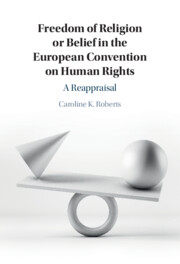Book contents
- Freedom of Religion or Belief in The European Convention on Human Rights
- Freedom of Religion or Belief in the European Convention on Human Rights
- Copyright page
- Dedication
- Contents
- Preface
- Acknowledgements
- Table of Cases, Applications and Communications
- Table of Treaties, Declarations and Other International Instruments
- Abbreviations
- Introduction
- Part I The Understanding of the Right to Freedom of Thought, Conscience and Religion in Echr Article 9
- Part II The ECtHR’s application of its general principles concerning the right to freedom of thought, conscience and religion in echr article 9
- 4 A High Degree of Forum Internum Protection under ECHR Article 9
- 5 A Low Degree of Forum Internum Protection under ECHR Article 9
- 6 A Range of Forum Internum Protection under ECHR Article 9
- 7 A Range of Forum Internum Protection under ECHR Article 9
- Part III reappraising the understanding of the right to freedom of thought, conscience and religion in echr article 9
- Bibliography
- Index
5 - A Low Degree of Forum Internum Protection under ECHR Article 9
from Part II - The ECtHR’s application of its general principles concerning the right to freedom of thought, conscience and religion in echr article 9
Published online by Cambridge University Press: 02 December 2023
- Freedom of Religion or Belief in The European Convention on Human Rights
- Freedom of Religion or Belief in the European Convention on Human Rights
- Copyright page
- Dedication
- Contents
- Preface
- Acknowledgements
- Table of Cases, Applications and Communications
- Table of Treaties, Declarations and Other International Instruments
- Abbreviations
- Introduction
- Part I The Understanding of the Right to Freedom of Thought, Conscience and Religion in Echr Article 9
- Part II The ECtHR’s application of its general principles concerning the right to freedom of thought, conscience and religion in echr article 9
- 4 A High Degree of Forum Internum Protection under ECHR Article 9
- 5 A Low Degree of Forum Internum Protection under ECHR Article 9
- 6 A Range of Forum Internum Protection under ECHR Article 9
- 7 A Range of Forum Internum Protection under ECHR Article 9
- Part III reappraising the understanding of the right to freedom of thought, conscience and religion in echr article 9
- Bibliography
- Index
Summary
Chapter 5 focuses on cases in which States have restricted the activities of individuals or communities due to concerns about religiously motivated harm. Firstly, it explores cases concerning sexual relations with minors, corporal punishment of children, compulsory vaccination refusal, and ceremonial use of illegal substances. These are the kinds of cases one would expect fall into the outermost circle in the loose concentric circles model, where there is weakest forum internum relevance and strongest countervailing factors and, thus a very low degree of forum internum protection. This chapter seeks to demonstrate that the ECtHR’s approach in such cases is as expected. Secondly, through an analysis of cases concerning allegations of threats to national security, challenges to rights and freedoms of members, and transgressions of health and safety laws, this chapter also aims to show that where the ECtHR considers the harm in question is not substantiated, or State actions are disproportionate, the ECtHR can, and does, give greater weight to forum internum relevance than to countervailing factors, and offer a higher degree of protection.
- Type
- Chapter
- Information
- Freedom of Religion or Belief in the European Convention on Human RightsA Reappraisal, pp. 120 - 138Publisher: Cambridge University PressPrint publication year: 2023



